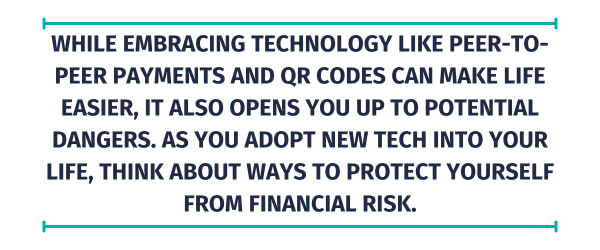Fight Fraud, Trust Your Gut, and Avoid These New Scams
10/10/2024
By: Conor Moreau

We love celebrating the latest tech advancement meant to simplify our lives, but as tech advances, so do scammers. As scammers' tactics evolve, it's important to educate yourself about new fraud attempts to best protect your finances. It isn't always as simple as ignoring a flashing scam call on your phone; sometimes, you need to go further to keep yourself safe.
Remember, if something doesn't feel right with a transaction, do not hesitate to contact Atlantic so we can help you through the situation. We're here for you, and we know it can feel embarrassing to fall victim to a scam, but scammers WANT you not to report it. Don't let them win; please bring anything unusual to our attention so that we can help.
So, what should you look out for?
Fraud Alert!
While fraud comes in all kinds of forms, these are some common dangers we've witnessed:
- Scammers love to use social engineering to influence people to share sensitive information. A common tactic is for a scammer to call up an elderly victim and impersonate a loved one requesting for an urgent situation - a car crash, a medical bill, or overdue rent. The victim shares the funds, desperate to help, and the money is gone.
- Malware, it's the oldest trick in the book, and it never goes out of style. Scammers love to bake malware into phishing emails or sketchy links. Always double-check a sender's email address before you click a link and confirm that it isn't a scammer spoofing a real address.
- QR Codes let us share information quickly with a click of your phone's camera, but they've also become an avenue for fraud - so let's dive deeper into how.

How QR Code Scams Work
While QR codes were originally created decades ago for inventory purposes, now, you see these codes in every advertisement – from postcards and signage to TV commercials and social media posts.
Creating QR codes is simple – so simple that fraudsters can make them in an instant. These fraudulent codes trick people into visiting a malicious website or downloading malware onto their devices. It’s another form of a phishing scam.
Here are some examples of scam QR codes that you may encounter:
- Scammers will cover official QR codes, like on parking meters, with fake ones, so instead of paying for your parking fare, you’re sending money to the scammer.
- Emails impersonating businesses will send you fake QR codes - usually using urgency about deliveries or services.
- Fraudulent social media ads may appear in your feed with QR codes that direct you to a website designed to steal your information, install malware on your device, or lure you into purchasing a fake product that doesn’t exist.
Protect Yourself
One of the greatest defenses against phishing scams via email or social media is the ability to identify the links before you click them. On your computer, you can hover over the link to determine if the URL is legitimate or fake.
However, these protections are stripped away by QR codes. Unfortunately, you do not know where the QR links until you scan it. This feature, designed to make QR codes so simple and easy to use, also creates one of the most significant vulnerabilities.
Always use caution when scanning a QR code from an unsolicited sender.

Be Careful With Peer-to-Peer Payments
Another new technology that's given scammers more tools is payment apps like CashApp, Venmo, and Zelle. It's never been easier to send money to someone – but it's a lot riskier, too.
Unlike traditional bank transfers, payments made through peer-to-peer payment apps are instant and almost irreversible. Once you send money to someone, even if it's a scammer, those funds are gone for good - the app won't reverse the transfer since you made it willingly.
Scammers will steal a credit card, 'accidentally' send a random person money, and then request repayment (along with a sob story). So, when you send money back from your account, they take the funds and run.
When the owner of the stolen card reports the fraud, the funds will vanish from your payment app, but you can do nothing to get reimbursed - the money you sent to the scammer is gone for good.

BUT HOW DO I STAY SAFE?
While embracing technology like peer-to-peer payments and QR codes can make life easier, it also opens you up to potential dangers. As you adopt new tech into your life, think about ways to protect yourself from financial risk.
- Ignore Payments & Requests from Strangers: If you receive a payment or a payment request from a stranger, do not respond! If you receive a payment from someone you don't know, ignore the payment and do not deposit these funds into your savings or checking account.
- Only Send Money to People You Know
- Report Suspicious Activity Immediately: Most apps allow you to flag transactions, but if you suspect you're a victim of fraud over the phone or in-person - contact us at 800-834-0432 or in branch.
- Double-Check! Before you send someone money or sensitive information, make sure you double and triple-check their identity. If you're ever unsure, it's always best to hold off!
- NEVER give out your banking information to anyone who requests it over the phone or the internet. No one from Atlantic will ever request your digital banking log-on information; always keep it private.
If you are a fraud victim, PLEASE contact us for help. There's nothing wrong with asking for help.
If you'd like to learn more about steps you can take to recover from fraud, check out our blog "How to Recover from Being a Fraud Victim."
We’re Here to Help!
As technology continues to evolve, it’s essential to stay vigilant against advancements in fraud practices, including QR code or payment app scams. By knowing how these scams function and their warning signs, you can protect yourself from falling victim to fraudsters.
If you suspect you were targeted by a scam or have been a victim of fraud, please contact us immediately. Financial security is our top priority, and we are here to assist you through any concerns or issues you may encounter. Please stop by any branch location or call 800-834-0432 to speak with a team member today.
Thank you to Atlantic's Cybersecurity Analyst, Emily Brassley, for providing up-to-date information on trending fraud attempts!
Stay up to date and join our email list.
The Atlantic blog strives to deliver informative, relevant, and sometimes fun financial information. If you enjoyed this article, please forward it to a friend.
Each individual’s financial situation is unique and readers are encouraged to contact the Credit Union when seeking financial advice on the products and services discussed. This article is for educational purposes only; the authors assume no legal responsibility for the completeness or accuracy of the contents.

